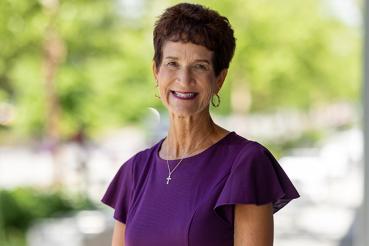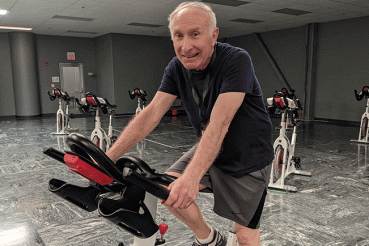I have been a nurse at Rush for 18 years. I have a great career, a great family, a great life. But the one thing in my life that I always struggled with was my weight. Despite being very active, I’ve never been able to control my weight since I was a child.
I was always hungry. I could eat all the time and never feel full. I did a million different diets, like Atkins and paleo, and nothing helped me keep the weight off.
In 2016, I got a wake-up call when I did my annual employee health screening at Rush. My lab results were not where I wanted them to be. I was listed as morbidly obese, I had high blood pressure, my cholesterol was high, and I was getting close to pre-diabetes. I was embarrassed and sad. I kept thinking, “What am I teaching my patients and my two young daughters if I can’t even control my own weight?”
I did not want to be 35 years old, morbidly obese and living this unhealthy lifestyle. So I decided to do something about it.
A bold decision
I reached out to bariatric surgeon Jonathan Myers, MD, whom I’ve worked with at Rush for years. He’s a trusted friend and an excellent bariatric surgeon. We discussed the different types of bariatric surgery and determined that laparoscopic gastrectomy (or gastric sleeve surgery) was the best option for me. In this procedure, Myers would remove part of my stomach, leaving a small sleeve-shaped stomach tube that would limit my food intake.
Before you have bariatric surgery, you have to go through a six-month journey through the bariatric surgery program that includes a number of different tests, a psychological evaluation and nutritional counseling. I had additional blood work, a chest X-ray, an EKG and a swallow study. The psych screening is important because it’s a major lifestyle change, and they want to make sure that you are psychologically prepared for it.
I met with a nutritionist for four months to prepare for the surgery and learn how to eat after the surgery. We talked about eating smaller meals throughout the day and what my healthy plate should look like. The surgery would shrink my stomach to the size of a cup, so I had to learn a completely new way of eating — much smaller portions and more often through the day.
The surgery
I had my bariatric surgery on August 16, 2016, and it went very well. I was a typical nurse patient; I wanted to get out of the hospital quickly, and I was up walking around right away. As a nurse, I know the importance of moving after surgery. It hurt a bit, but it was all laparoscopic so I just had four little sites on my belly instead of a big incision. I was out of the hospital in 24 hours. (Most bariatric surgery patients are out within 24-48 hours.)
At home, I was in some pain, but I controlled it with ibuprofen. I walked around, stayed active and sipped on fluids every hour as instructed. I was back to work in two weeks.
A new way of eating
For at least two weeks after the surgery, you have to do a liquid diet, drinking just protein shakes. After that, you slowly introduce soft foods for another two weeks. Eventually, you start incorporating solid foods back into your diet.
The weird thing is that you aren’t really hungry after the surgery because during the surgery they remove the sensors in your stomach that alert you that you are hungry. The hunger sensation does come back eventually, but it’s never an intense “Oh my God, I’m starving and I need to eat now” feeling.
Before the surgery, I could eat about four pieces of pizza in one sitting without batting an eye. After the surgery, though, my stomach is smaller and I physically cannot eat that much. Now, I only eat one slice of pizza, half a sandwich or half a cheeseburger. And I eat small meals throughout the day.
I still enjoy food. I can basically eat anything I want, just smaller portions. I’m not depriving myself of anything, but I’m being healthier. And I feel great. I’m not tired anymore. My back doesn’t hurt. I can keep up with my kids.
The results
It’s been two years since my surgery, and I am down 70 lbs. — from 220 lbs. to 152 lbs. I’ve gone from a size 18 to a size 8. My bloodwork is all normal and I went off blood pressure medication about six months after surgery.
Now for the cherry on top. About three months ago, I had a tummy tuck with Keith Hood, MD, at Rush. He took 7 lbs. of skin off my belly. I had always carried my weight in my stomach and I had had two kids. So after I lost all this weight, the skin was just hanging there.
This summer, for the first time in my life, I put on a bikini on vacation in Florida. I wore it the whole time I was there, never once covering up or hiding behind a towel. It felt incredible.
Doing the bariatric surgery has completely changed my life. This is the happiest and healthiest I’ve ever been, and I finally feel good in my own skin.
Jennifer Grenier, PhD, RN, held several nursing leadership positions at Rush University Medical Center and Rush Oak Park Hospital before accepting a position as associate chief nurse at MacNeal Hospital in Berwyn.




